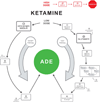Ketamine as a promising prototype for a new generation of rapid-acting antidepressants
- PMID: 25727103
- PMCID: PMC4412785
- DOI: 10.1111/nyas.12718
Ketamine as a promising prototype for a new generation of rapid-acting antidepressants
Abstract
The discovery of ketamine's rapid and robust antidepressant effects opened a window into a new generation of antidepressants. Multiple controlled trials and open-label studies have demonstrated these effects across a variety of patient populations known to often achieve little to no response from traditional antidepressants. Ketamine has been generally well tolerated across patient groups, with transient mild-to-moderate adverse effects during infusion. However, the optimal dosing and route of administration and the safety of chronic treatment are not fully known. This review summarizes the clinical effects of ketamine and its neurobiological underpinnings and mechanisms of action, which may provide insight into the neurobiology of depression, relevant biomarkers, and treatment targets. Moreover, we offer suggestions for future research that may continue to advance the field forward and ultimately improve the psychopharmacologic interventions available for those individuals struggling with depressive and trauma-related disorders.
Keywords: antidepressant; depression; ketamine; neurobiology; treatment mechanisms.
Published 2015. This article is U.S. Government work and is in the public domain in the USA.
Conflict of interest statement
Dr. Averill declares no conflicts of interest.
Figures


References
-
- Kessler RC, et al. The epidemiology of major depressive disorder: results from the National Comorbidity Survey Replication (NCS-R) JAMA : the journal of the American Medical Association. 2003;289:3095–3105. - PubMed
-
- Rush AJ, et al. Acute and longer-term outcomes in depressed outpatients requiring one or several treatment steps: a STAR*D report. The American journal of psychiatry. 2006;163:1905–1917. - PubMed
-
- Katz MM, et al. Onset and early behavioral effects of pharmacologically different antidepressants and placebo in depression. Neuropsychopharmacology : official publication of the American College of Neuropsychopharmacology. 2004;29:566–579. - PubMed
-
- Gaynes BN, et al. What did STAR*D teach us? Results from a large-scale, practical, clinical trial for patients with depression. Psychiatric services (Washington, D.C.) 2009;60:1439–1445. - PubMed
Publication types
MeSH terms
Substances
Grants and funding
LinkOut - more resources
Full Text Sources
Other Literature Sources
Medical

